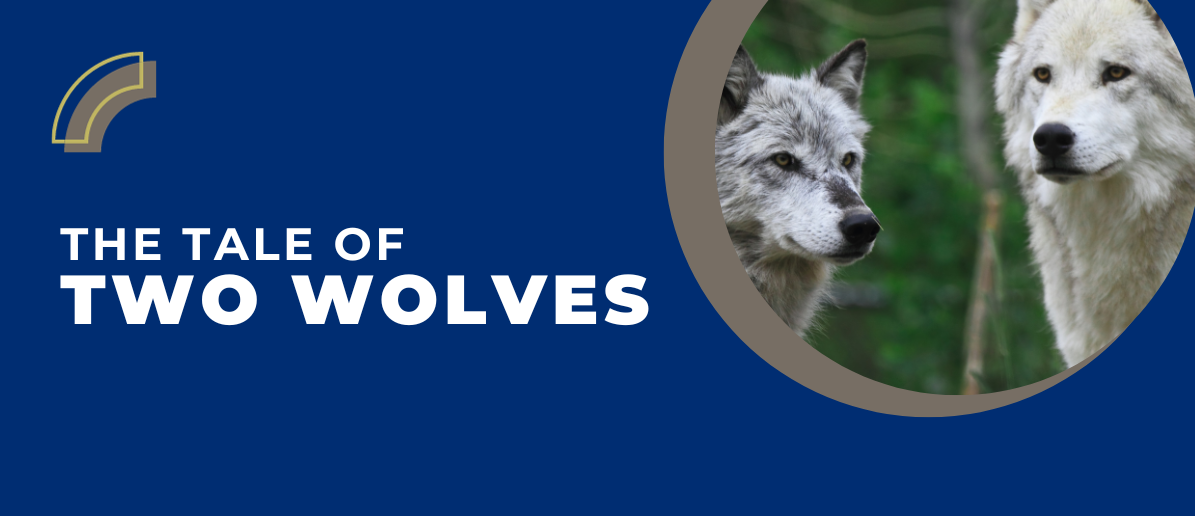One night, a grandfather explains to his grandson about the inner conflict within him.
He says to his grandson, “A fight is going on inside me. It is a terrible fight, and it is between two wolves. One is evil – he is anger, envy, sorrow, regret, greed, arrogance, self-pity, guilt, resentment, inferiority, lies, false pride, superiority, and ego.”
The grandfather continued, “The other is good – he is joy, peace, love, hope, serenity, humility, kindness, benevolence, empathy, generosity, truth, compassion, and faith.”
He gazed at his grandson and resumed, “The same fight is going on inside you, and every other person, too.”
The grandson thought about it for a minute and then asked his grandfather, “Which wolf will win?”
The grandfather replied simply, “The one you feed.” 1
Love and Fear
The Tale of Two Wolves is a Native American parable, usually ascribed to Cherokees. Its tremendous visual imagery draws in listeners to a fresh perspective on good and evil.
Every spiritual tradition addresses the fundamental human question about good and evil. The inner conflict is real and one each person must face.
Non-spiritual people can interpret this concept as whichever wolf you choose is self-prophesizing. If you choose the good wolf, you will experience the good in yourself and others. If you choose the evil wolf, you will encounter the opposite.
I view the wolves as love and fear. All the good traits described by the Old Cherokee can be summed up as aspects of love whereas the evil attributes stem from fear.
Consequences
The grandfather tells his grandson that his choices have consequences. Whichever wolf he feeds will win.
Choice is key here. Thoughts are powerful. Every thought pattern, whether positive or negative, leads to behaviours based on choices you make, both positive and negative.
Not making a choice isn’t an option either. Not making a choice holds consequences ipso facto.
Wolves in Situ
I’ve mentioned my disastrous project management job before. It remains the worst workplace culture I ever experienced – stressful, unsupportive, and embedded with narcissists.
Negative Choice
In that morass of negativity, it was hard to see my choice within it. I didn’t “choose” to work in an unhealthy environment. This was thrust upon me, and I just needed to deal with it.
Can you hear the grandfather’s evil wolf in these statements? Anger, self-pity, resentment, lies, and so on.
No Choice
I worked in this role for two and a half years. Like I said, not making a choice has consequences also. Physically, I felt stressed much of the time. Emotionally, I felt drained (narcissists are energy vampires). Mentally, I felt assaulted. Spiritually, I felt lost.
I disengaged at work and looked elsewhere to confirm normalcy through family, friendships, and social activities.
Positive Choice
Eventually, I quit. Although I had no other job, I knew I couldn’t continue in this role. I had already decided to study coaching and had paid for it in full upfront because I was 100% committed to my new career. Within six weeks of quitting, I had taken the first coaching course and started a new role – my final HR one.
The Lesson
My positive choice fed the good wolf within me. While I could have chosen positively sooner, when I realized early on how dysfunctional the culture was, I didn’t trust myself enough then. I’ve learned my lesson.
Each person must confront the internal conflict of love versus fear, as the grandfather points out. It’s an ongoing battle because of free will. In every moment, you have a choice in terms of how you respond to any situation.
Choose love.
Feed your good wolf.
1 There are so many references to this story online, using almost identical language, that I can’t footnote this tale appropriately. I suppose you could start with the Wikipedia reference.

